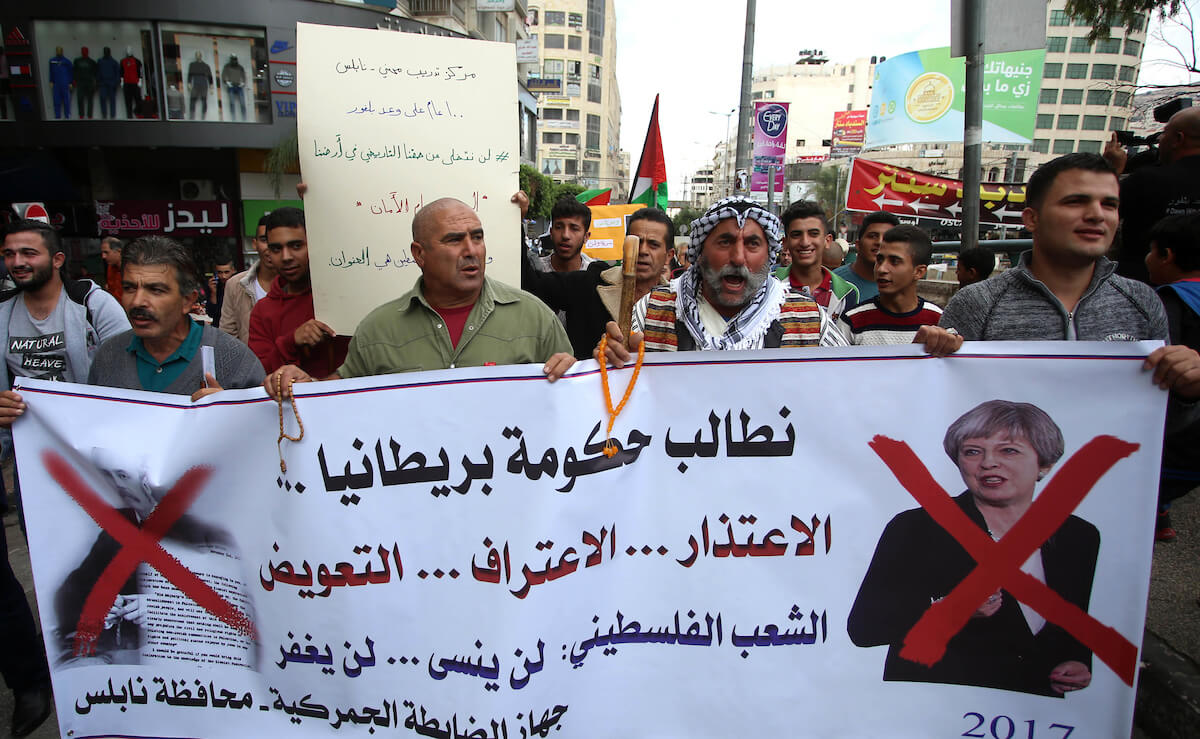The Balfour Declaration was a wartime play by the British government to win international Jewry to its side. This meant the Russian masses in the U.S., and banker Jacob Schiff, who were against American entry into the war. The British may have exaggerated Jewish power, but Zionists lobbied successfully for the declaration by citing such power, marking the entry of the Israel lobby on the world stage.
As the hundred year anniversary of the Balfour Declaration takes way, Palestinian President Mahmoud Abbas and Prime Minister Rami Hamdallah, as well as various other Palestinian politicians are calling on the United Kingdom to not only apologize to the Palestinian people for the “suffering” caused by the declaration, but to also recognize Palestine as a state. Meanwhile, the UK is planning quite the opposite, as Israeli Prime Minister heads to a state dinner organized by UK Prime Minister Theresa May to celebrate the centennial.
Mohammad Arafat writes, “‘Once we heard about the declaration, we knew the future of Palestine and the Palestinians was in danger,’ Um Abed so softy I could barely hear her. She couldn’t say more without crying.”
It is time that British Government declare that Israel has never lived up to the revered Balfour Declaration and rescind it once and for all. For if Great Britain believes in human rights and democracy, it will demand that Israel recognize the right of Palestinian refugees and their offspring to return home and to live as equal citizens under a representative government.
Rana Askoul writes to British Prime Minister Teresa May: “I hear you will be celebrating the centenary of the Balfour declaration with ‘pride’. I hear you also said that you will be conscious of the sensitivities that some people have about the Balfour declaration and that there is more work to be done. Pride, sensitivities, some people, more work. In my mind, I picture you standing in front of my paternal grandmother, as she walked on her journey out of Palestine to Lebanon in 1948, clutching my father as a baby to her chest. I see you uttering these words to her. Pride, sensitivities, some people, more work. It seems Ms. May, you also have not the slightest clue as to how we Palestinians can move on. It seems Ms. May that you too, like your predecessors have chosen the easier wrong, over the harder right. It seems Ms. May, that you too need a lesson as to why we need to apologize when we have done wrong.”
Britain fulfilled its promise to the Zionists in full, but broke even its feeble commitment to the Palestinians to protect their civil and religious rights. An apology from Britain is long overdue, as are efforts to repair the damage it initiated 100 years ago.
The commemoration of the Six-Day War that resulted in the fifty-year occupation is a solemn moment to reflect on the magnitude of the dispossession of the Palestinian people, the multitude of daily indignities of life under occupation, and the relentless violence of Israel’s military against a defenseless imprisoned people. But to some liberal Zionists, like Israeli historian Gershom Gorenberg, the focus only seems to be about how “the occupation” hurts Israel.
Memoirs by American Jews reveal that the 1967 war revolutionized Jewish life: even leftwingers like Joel Kovel were initially swept up in the fear for Israel and excitement over its victory, but those fears helped produce the most powerful force in American Jewish life since: the neoconservatives who, inflamed by memories of the Holocaust, vowed to support Israel in the face of an indifferent world.
Khalid Saifi was only ten years old when the 1967 war happened. Much of his memories come in bits and pieces, but some moments will stick with him for the rest of his life. Khalid’s father, a refugee who fled from al-Walaja village in 1948, refused to flee yet again, however Khalid’s mother was adamant she get her two youngest children, Khalid and his little sister, out of harm’s way. “My mother decided to stay longer at the crossroads with me and my little sister, so we stood there in the middle of the intersection and watched my two sisters and their husbands walking away in opposite directions for a long while,” Khalid remembers. “My mother stood there watching them. I remember that image so clearly — her standing there watching my sisters walk and walk off into the distance.”









